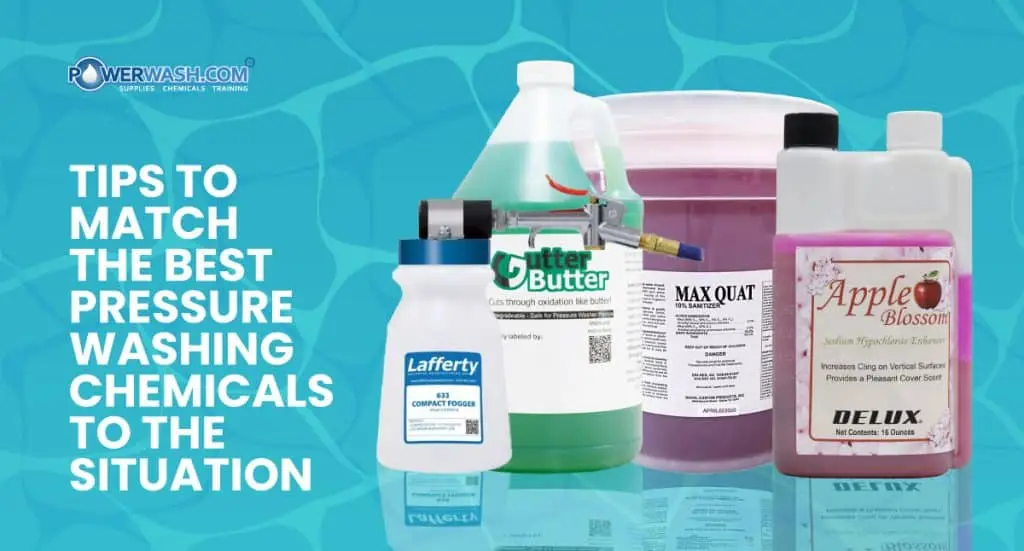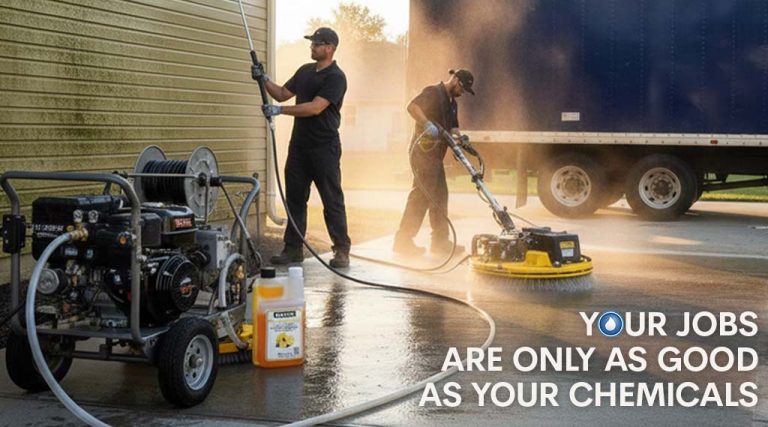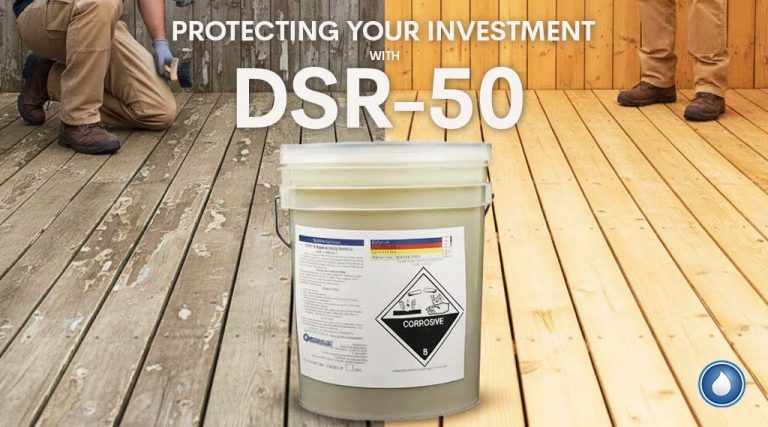Choosing the best pressure-washing chemicals can be challenging, whether you’re on a website product page or in the home improvement superstore aisle. It all depends on the stains you’re trying to remove and the surface you’re cleaning. Keep reading to learn five tips on how to pick the best pressure-washing chemicals for any situation.
What are pressure-washing chemicals?
Pressure washers use a pump to spray water at high speeds to remove stains, dirt, rust, and more from surfaces with less effort than scrubbing. However, you often need more than just water to clean surfaces. Pressure washers contain compartments you can fill with chemicals to better clean surfaces and treat them to prevent future staining.
No single product or chemical will be effective for every project. Professional cleaners should establish a detergent arsenal for all the many conditions they may encounter.
How do you pick the right pressure-washing chemicals for the job?
Once you determine the surface you’re pressure washing, the stain or substance on the surface, the environment, and the type of pressure washer you will be using, you can choose a detergent that will work for your project. Also, consider the following questions:
– Will your detergent flow through the pressure washer or be added downstream?
– Will you purchase pre-mixed chemicals or mix water into concentrated chemicals yourself?
– The correct pressure-washing chemical will safely remove the stains from the surface without causing damage and will prevent the stains from happening again.
How to Know Which Product to Use for Pressure Washing
1. Identify the Stain
Identifying the kind of stain you are trying to remove will be essential in deciding what detergent to choose for your pressure-washing job.
- Are you trying to wash away something greasy, like engine oil? If so, you will want to use a degreaser or soap to bind with the oil and lift it out.
- Is it a living stain, like moss, algae, or lichen? You’ll need a sanitizer like Sodium Hypochlorite, which will kill the organism and prevent it from returning. Remember that pressure or agitation is not required for the sodium hypochlorite to work.
- Soft washing is widely used on soft surfaces such as roofing shingles, wooden decking, plaster, soft rock, and color-safe textiles. There are several devices available for gently washing a surface.
2. Know Your Pressure-Washing Environment
If your client has pets, kids, or a vibrant garden, you want to avoid using certain chemicals in your power-washing job. Check the MSDS of your product to be sure you’re not endangering any plants or animals with your chemicals.
You will also want to be sure that you can safely wash chemicals down storm drains if you’re power washing outdoors. The packaging should tell you whether your product is biodegradable.
3. Know the Surface You Are Pressure Washing
When pressure washing any surface, it is important to take caution and use the correct chemicals. Hard surfaces such as most driveways, sidewalks, and patios must be pressure washed with a cleaner containing added bleach. This will help to remove any stains or build-up on the surface.
For softer surfaces, such as decks and porch furniture, you should use a cleaner specifically designed for soft washing to help protect the surface from damage.
Some surfaces are vulnerable to certain chemicals. For example, protective wraps over the top of vehicle paint jobs can be degraded by acid, even if you use a low psi to wash the vehicle.
Lastly, you should always test the pressure washer on a small surface area before proceeding with the entire project. By taking these precautions, you can ensure that your pressure-washing project is a success.
4. Know Whether Your Detergent Will be Upstream or Downstream
Two distribution techniques are used to carry the detergent to the washer: upstream and downstream. Whether you use upstream or downstream injection, the amount of detergent required will depend on the pressure and flow rate of the pressure washer and the surface type.
Upstream Delivery: In upstream injection, chemicals are injected into the pressure washer’s inlet before the water enters the pump. This method is ideal for high-pressure applications where excessive foam could clog the pressure washer’s pump. Cleaning chemicals are delivered upstream through the pump and numerous other washer components resulting in increased pressure and greater temperatures. However, the chemicals may eventually destroy the components.
Downstream Delivery: Downstream injection involves injecting chemicals into the pressure washer’s outlet after the water has passed through the pump. Downstream delivery introduces cleaning chemicals into the washer, which is the way to go if you use chemicals that can potentially damage your pump, such as bleach. This method is typically used for lower-pressure applications where downstream pressure can help to atomize the chemical and ensure even distribution.
5. Know You Need Specialty Pressure-Washing Chemicals
Pressure washers require specialized soaps and detergents. Regular soaps, such as laundry, dish, or household cleansers, are not designed to survive the intense pressure delivered by a power washer.
So, while shopping for pressure washer soap or detergent, be sure it’s manufactured specifically for pressure washers. Many of these may be used with any pressure washer; however, read your owner’s handbook to see if the manufacturer suggests any specific equipment cleaning and which quantities of detergent to use.
The more closely you adhere to the guidelines, the longer your pressure washer will last.
Key Takeaways:
- Multiple factors affect being able to choose the best power-washing chemicals.
- Once you determine the surface you’re pressure washing, the stain or substance on the surface, the environment, and the type of pressure washer you will be using, you can choose a detergent that will work for your project.
- Know what you’re washing away, what surface you’re washing off, what environment you’re power washing around, whether you will mix in your detergent upstream or downstream, and how to maintain your pressure washer.
- Two distribution techniques are used to carry the detergent to the washer: upstream and downstream.
- Pressure washers require specialized soaps and detergents. Regular soaps, such as laundry, dish, or household cleansers, are not designed to survive the intense pressure delivered by a power washer.
The Right Power Washing Tools
Before starting your next pressure-washing project, read these tips and ensure you have the right chemicals for the job. And if you are still unsure what to do or which product is best for the surface you are trying to clean, don’t worry! Not all pressure-washing projects will require the same approach, but no matter what you need to get started, we can help. Head to PowerWash.com for the best equipment options, and don’t forget to check out Power Wash Academy to learn new power washing techniques!




